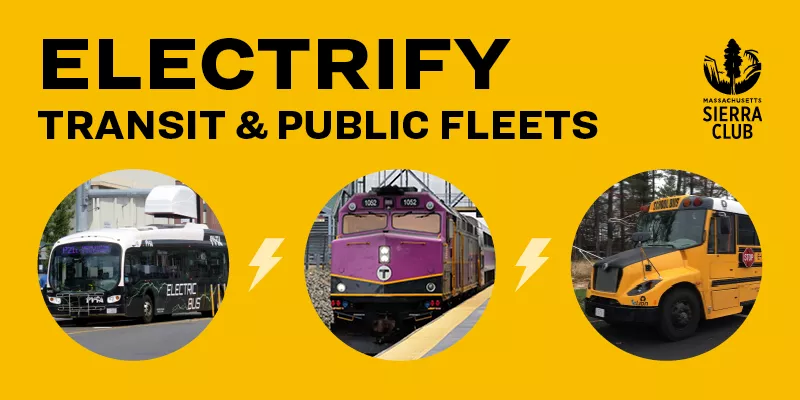
The Massachusetts legislature has played a pivotal role in advancing climate policies by passing key climate bills in the last two sessions. While we are making progress towards our climate goals, the Massachusetts Climate Report Card released last December clearly shows that the state must do much more in a short period to meet our 2030 targets[1]. This means that in addition to implementing existing policies, we must continue to enact strong and ambitious legislation to help close the gap in our transition to a clean energy economy. This is especially true for our state transportation sector, the largest contributor to Massachusetts’ air and climate pollution.
Of the many pathways available to reduce transportation emissions, vehicle electrification has remained the cornerstone of Massachusetts' climate plan to decarbonize this sector. Electrification is a crucial strategy to reduce transportation emissions. However, which parts of our transportation system we electrify first will signal our commitment to encouraging mode shift and reducing traffic congestion. This decision will also determine who gets to enjoy the benefits of electrification first.
Transportation pollution is overwhelmingly concentrated in environmental justice and low-income communities where electric vehicle adoption is not yet an option for many. Prioritizing electrifying transit and school bus fleets can have enormous co-benefits for air quality and public health across the state, especially in these communities.
We commend the legislature for passing the 2022 climate bill requiring the Massachusetts Bay Transportation Authority (MBTA) to transition to an all-electric bus fleet by 2040. With another climate bill on the horizon, the legislature must not delay establishing phased electrification targets for our transit and school bus fleets now.
Fleet electrification is a multi-year process and setting an actionable target is the starting point for agencies to assess the scope, costs, vehicle procurement timelines, grid upgrades, and other planning needs related to electrification. We are already running against time and any delay in starting this process will impact the timeline for full electrification.
We urge the legislature to pass a climate bill that includes an ambitious timeline to electrify our commuter rail network, school bus fleets, and the bus fleets at the 15 Regional Transit Authorities (RTAs).

Establish actionable targets to electrify the commuter rail system.
The MBTA’s commuter rail system connects 75% of the state’s population. It should play a central role in encouraging mode shift and connecting people to jobs, services, and recreation. However, service on the commuter rail remains inadequate, fares are out of reach for many, and the system continues to be powered by polluting diesel locomotives.
An Act relative to setting deadlines to electrify the commuter rail (H.3392/S.2217) would:
- Set phased and line specific electrification and service frequency targets for the different commuter rail lines.
- Support frequent all-day, rapid, clean, and reliable commuter rail service.
- Prioritize electrification of lines serving environmental justice populations and reduce toxic air pollution for communities all along the route.

Electrify school buses, provide children with a clean ride.
A vast majority of the 8,000+ school buses in Massachusetts are powered by diesel, exposing over 400,000 children to toxic air pollution and serious health risks. School buses with their predictable routes are an ideal candidate for electrification. In addition to the public health, climate, and economic benefits of electrification, when not transporting students, electric school buses can use vehicle to grid (V2G) technology to send energy back to the grid during peak demand events and power outages.
An Act setting deadlines for school bus and public fleet electrification, and programs to encourage electrification of private fleets (S.2218/H.3139) would:
- Establish phased targets for school bus fleets to be all-electric by 2035.
- Encourage more school districts to leverage federal and state funding available.
- Help school districts create an implementation roadmap to support this transition.

Support regional transit authorities in their transition to a zero emission fleet
The 15 Regional Transit Authorities (RTAs) serve over 250 communities in the state. They are a lifeline for residents, especially for low-income residents, people of color, older adults, and people with disabilities who are transit dependent or cannot afford a personal vehicle. Electrifying the RTA bus fleet will provide those most dependent on public transit with a cleaner ride, improve air quality, and reduce health impacts and disparities in pollution burdens.
An Act electrifying regional transit authorities (RTA) (H.3366/S.2285) would:
- Establish interim targets for RTA fleets to be all-electric by 2035 and prioritize deployment on routes serving environmental justice populations.
- Create a central planning office at MassDOT to provide RTAs with technical, planning, and implementation support to transition to an all-electric fleet.
- Provide job retraining experience
We have the technology to make our transit system and public fleets cleaner. But our policies are not keeping pace with what’s needed to adequately address climate change. We do not have the time for small incremental changes. Massachusetts should not have to wait another two years to start implementing transportation policy changes that are needed to reach our climate goals and meet our commitment to environmental justice. We need action now.
[1] Massachusetts Climate Report Card, Office of Climate Innovation and Resilience, December 1, 2023, https://www.mass.gov/report/massachusetts-climate-report-card
Photo Credits for the first image:
Left: Photo by Wikimedia Commons user Pi.1415926535, licensed under the Creative Commons BY-SA 3.0 license
Middle: Photo by Wikimedia Commons user Pi.1415926535, licensed under the Creative Commons BY-SA 4.0 license
Right: Photo by Brian Foulds, Concord-Carlisle Regional School District, National Renewable Energy Laboratory
Credit commuter rail graphic : Megan Szostak
Credit electric school bus graphic: Megan Szostak
Credit diesel vs Electric bus graphic: John Sherffius